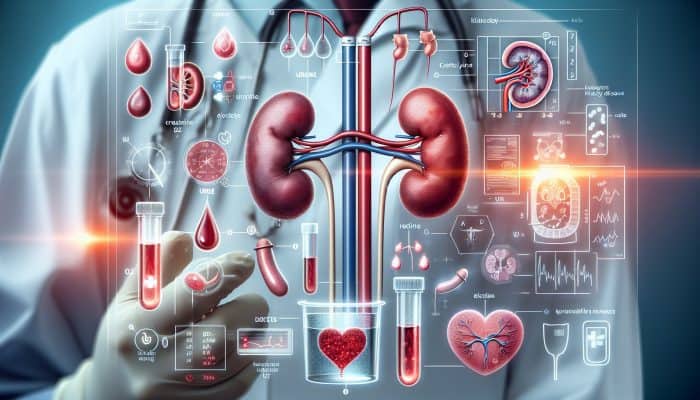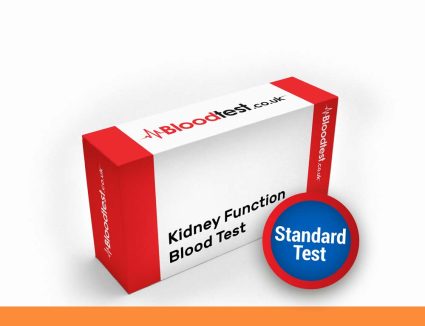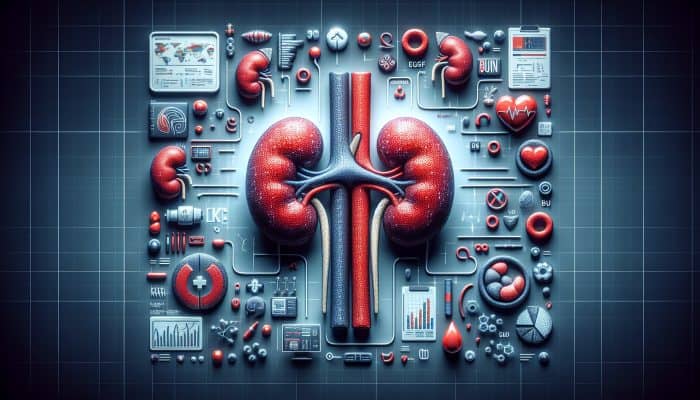Unlocking the Importance of Kidney Blood Tests for Optimal Health
Discovering Health Issues Through Kidney Blood Testing

In Rawtenstall, the significance of undergoing a kidney blood test is paramount for maintaining renal health. This essential diagnostic procedure evaluates a variety of waste products present in the bloodstream, making it indispensable for diagnosing numerous kidney-related health conditions. The kidney blood test is particularly effective in identifying chronic kidney disease, acute kidney injury, and kidney infections, among other ailments. This test primarily measures the levels of creatinine, urea, and electrolytes, which serve as vital indicators of the kidneys' efficiency in filtering waste and maintaining a proper electrolyte balance within the body. By meticulously examining these markers, healthcare professionals can assess how well the kidneys are functioning and manage any detected issues.
For example, elevated levels of creatinine can indicate compromised kidney functionality, while increased levels of urea may suggest that the kidneys are struggling to filter waste effectively. The value of these tests extends beyond immediate insights into kidney health; they also inform further diagnostic steps and treatment strategies. Regular kidney blood tests are especially beneficial for individuals with pre-existing conditions such as diabetes or hypertension, as these conditions significantly heighten the risk of developing renal complications. Proactively monitoring kidney health is an essential aspect of overall well-being.
Determining the Right Frequency for Your Kidney Blood Tests
The interval at which kidney blood tests should be conducted primarily hinges on an individual’s specific health conditions and associated risk factors. For those with risk factors such as diabetes, hypertension, or a family history of kidney disease, it is typically advised to have these tests performed on an annual basis. However, individuals displaying symptoms that may indicate kidney dysfunction—such as persistent fatigue, noticeable swelling, or alterations in urination patterns—should engage with their healthcare provider to develop a customised testing schedule tailored to their needs.
Furthermore, patients undergoing treatments that could adversely affect kidney function, such as certain medications or chemotherapy, may require more frequent monitoring. Consistent evaluations are crucial for those at heightened risk, as early detection of kidney issues enables timely intervention, thereby potentially mitigating the risk of further complications. Therefore, collaborating with a healthcare professional to establish a regular testing routine is vital in addressing any decline in kidney function as swiftly as possible.
Listen to Our Comprehensive Audio Guide!
 Essential Steps to Prepare for Your Kidney Blood Test
Essential Steps to Prepare for Your Kidney Blood Test
Preparing for a kidney blood test involves several essential steps that are crucial for ensuring the accuracy of the results. Generally, patients are advised to fast for a duration of 8 to 12 hours prior to the test. This fasting period is vital for obtaining more precise measurements of specific markers, as food consumption can significantly impact blood composition, particularly affecting levels of urea and creatinine. Moreover, patients must inform their healthcare provider about any medications they are currently taking, as certain drugs may interfere with the test results.
Other preparation recommendations include ensuring adequate hydration, as optimal fluid intake can influence kidney function and the concentration of waste products in the bloodstream. It is also advisable to avoid strenuous physical activity before the test since such exertion can lead to temporary alterations in blood composition. Following these preparation guidelines is essential for obtaining reliable results that accurately reflect an individual’s kidney function, thus facilitating better health management.
Gaining Insights from Your Kidney Blood Test Results

The results from a kidney blood test provide vital insights into the functionality of the kidneys and the overall health status of an individual. The primary markers assessed during this test include creatinine, blood urea nitrogen (BUN), and the estimated glomerular filtration rate (eGFR). Elevated levels of creatinine typically indicate impaired kidney function, while high levels of BUN may suggest dehydration or excessive protein intake. The eGFR is especially valuable for estimating kidney function based on factors such as creatinine levels, age, sex, and race.
When healthcare professionals interpret these results, they compare them to established normal ranges. Deviations from these ranges can signify potential kidney issues, necessitating further assessment or intervention. For example, consistently high levels of these markers may indicate chronic kidney disease or acute kidney injury, possibly leading to additional testing or referrals to specialists. Understanding these results is crucial, as they guide the necessary steps for preserving or enhancing kidney health, thus emphasising the importance of proactive healthcare.
Locating Trustworthy Kidney Blood Testing Services in Rawtenstall
Leading Clinics in Rawtenstall Providing Kidney Blood Testing Services
In Rawtenstall, numerous clinics offer comprehensive kidney blood testing services as part of their standard health evaluations. Noteworthy facilities include the Rawtenstall Medical Centre and the Valley Medical Practice, both of which are equipped to conduct thorough kidney assessments. These clinics play a vital role in ensuring that residents have access to high-quality healthcare, providing not only blood tests but also consultations with qualified healthcare professionals who can interpret the results and recommend suitable treatment options.
These clinics typically incorporate kidney blood tests into broader health assessments, catering to a diverse patient population, including those with chronic health conditions. Furthermore, some local pharmacies may also offer basic health screenings, including evaluations of kidney function. It is advisable for individuals to contact the clinics directly for specific information regarding their services and availability of appointments, enabling them to make informed decisions about their healthcare.
Steps to Schedule Your Kidney Blood Test Appointment

Arranging an appointment for a kidney blood test in Rawtenstall is usually a straightforward process. Patients can often book their appointments through various methods. Most clinics feature user-friendly websites that facilitate online scheduling, enabling individuals to select a convenient time slot. Alternatively, those who prefer to discuss their needs can contact the clinic’s reception for assistance in organising an appointment.
For those who prefer face-to-face interactions, visiting the clinic directly to arrange an appointment is also a viable option. It is advisable to confirm any necessary preparations required prior to the test during the booking process. This ensures that patients are adequately informed and prepared for their visit, ultimately enhancing the likelihood of obtaining accurate and reliable test results that reflect their kidney health accurately.
Exploring Walk-In Services for Kidney Blood Tests
Several clinics in Rawtenstall may offer walk-in services for kidney blood tests, providing a flexible option for those requiring immediate testing without a prior appointment. However, the availability of walk-in services can vary between clinics, so it is wise to check with the specific clinic beforehand. Some clinics may allocate particular times for walk-in patients, while others might prefer to schedule appointments to effectively manage patient flow.
Patients should be prepared for potential wait times, particularly during peak hours. If opting for a walk-in test, arriving early in the day can enhance the chances of being seen promptly. Confirming the clinic’s policy regarding walk-in services in advance can save time and contribute to a smoother experience, ensuring that individuals receive the necessary care without unnecessary delays.
Understanding the Costs Associated with Kidney Blood Tests in Rawtenstall
The cost of a kidney blood test in Rawtenstall can vary based on several factors, including the specific clinic selected and whether any additional tests are conducted alongside the kidney evaluation. Generally, prices range from £30 to £100. Many residents may discover that these tests are covered by the NHS, depending on their medical history and specific health needs.
For those opting for private healthcare, verifying the individual clinic’s pricing structure and what is included in the test fee is advisable. Understanding the costs beforehand can empower patients to make informed decisions regarding their healthcare options. Additionally, some clinics may offer financial assistance or payment plans to individuals lacking insurance or those encountering financial difficulties, thereby making kidney health assessments more accessible to all.
Anticipated Timeframe for Receiving Kidney Blood Test Results
Typically, results from a kidney blood test are available within a few days; however, the precise timeframe may depend on the clinic’s processing capabilities. Most clinics strive to deliver results promptly, often within 48 to 72 hours. Nonetheless, in situations where urgent testing is necessary, such as for acute renal issues, results may be expedited to facilitate timely interventions.
Patients are encouraged to discuss with their healthcare provider how they will receive their results. This may include options such as phone calls, secure online portals, or follow-up appointments. Being aware of the expected timeframe for receiving results helps patients manage their anxiety and prepare for any necessary subsequent steps based on those results, ensuring they are informed and ready to take action.
Decoding Your Kidney Blood Test Results
Comprehending the Markers in Your Kidney Blood Test
The various markers evaluated in a kidney blood test provide essential insights into kidney health and function. The primary markers assessed include creatinine, blood urea nitrogen (BUN), and estimated glomerular filtration rate (eGFR). Elevated levels of creatinine frequently indicate a decline in kidney function, as creatinine is a waste product produced from muscle metabolism that the kidneys should filter efficiently.
Blood urea nitrogen (BUN) measures the concentration of urea nitrogen in the blood, which can signify how effectively the kidneys are filtering waste. Increased BUN levels may indicate kidney dysfunction or dehydration, warranting further investigation. The eGFR serves as a calculated metric that estimates the kidneys' ability to filter blood; a lower eGFR suggests reduced kidney function, which may signal chronic kidney disease or other renal concerns.
Understanding the significance of these markers is vital for anyone undergoing a kidney blood test, as they form the foundation for assessing kidney health and determining subsequent interventions if necessary. Patients should actively engage with their healthcare providers to ensure they fully comprehend the implications of their results and the necessary actions based on those findings.
Assessing the Results of Your Kidney Blood Tests
Evaluating the results of kidney blood tests involves comparing individual markers against established normal ranges. Each marker has a reference range, and any deviations from these ranges could indicate potential kidney issues. For instance, elevated levels of creatinine or BUN may necessitate further investigation, while a significantly low eGFR could suggest advanced kidney disease.
Healthcare providers typically consider a patient’s medical history, symptoms, and overall health when interpreting test results. Patients must engage in discussions with their healthcare providers regarding the implications of their test outcomes. In certain cases, abnormal results may require additional diagnostic tests, such as imaging studies or urine analyses, to further evaluate kidney function and identify any underlying causes for the observed abnormalities. This collaborative approach ensures comprehensive understanding and effective health management.
Patients should feel empowered to ask questions or seek clarification regarding their results. Gaining insight into the context and implications of these results allows patients to take an active role in managing their health and making informed decisions.
Next Steps If Your Kidney Blood Test Results Are Abnormal
Should kidney blood test results yield abnormal findings, it is crucial to promptly consult with a healthcare provider. Such findings may indicate underlying kidney issues that necessitate further assessment or intervention. Typically, the healthcare professional will discuss the findings, their potential implications, and recommend an appropriate follow-up plan tailored to the patient’s needs.
This follow-up plan may involve additional tests to identify the cause of the abnormal results, such as imaging studies or urine analysis. Depending on the severity and nature of the findings, treatment options may range from lifestyle modifications to more advanced medical interventions. Patients should actively engage in discussions concerning their health, posing questions to better understand the next steps and how to effectively manage their condition.
Establishing a follow-up schedule with the healthcare provider is essential for monitoring kidney health and making necessary adjustments to treatment plans based on ongoing assessments and test results, thus ensuring comprehensive management of renal health.
Expert Perspectives on Kidney Blood Testing in Rawtenstall
Innovations in Kidney Blood Testing Techniques
Recent advancements in kidney blood testing have significantly improved early detection and ongoing monitoring of renal health. These innovations enhance the sensitivity and specificity of tests, facilitating timely interventions. Key advancements include:
- Enhanced Biomarkers: The introduction of novel biomarkers can improve detection rates of kidney diseases at earlier stages.
- Non-invasive Testing: Developments in non-invasive testing methods reduce the need for traditional blood samples, making assessments more comfortable for patients.
- Point-of-care Testing: Technologies that enable testing at the point of care allow for immediate results, facilitating quicker clinical decisions.
- AI Integration: Artificial intelligence is increasingly being utilised to interpret test results, providing more accurate assessments and predictions of kidney health.
These advancements underscore the necessity of regular kidney function testing, especially for individuals with risk factors. Healthcare practitioners should remain informed about the latest developments to provide optimal care and support for their patients, ensuring that they benefit from the most current knowledge and technology.
Recommended Strategies for Post-Testing Kidney Health Management
Following a kidney blood test, effective management of kidney health is essential for individuals concerned about their renal function. Experts recommend several strategies to maintain and enhance kidney functionality, including:
- Healthy Eating: Embracing a balanced diet rich in fruits, vegetables, and whole grains can significantly support kidney health.
- Staying Hydrated: Adequate hydration is crucial for optimal kidney function; aim to consume sufficient water daily.
- Regular Exercise: Incorporating consistent physical activity helps maintain a healthy weight and supports overall kidney health.
- Routine Monitoring: Consistent follow-up appointments and blood tests are vital for ongoing evaluation of kidney function.
By implementing these actionable steps, individuals can strengthen their kidney health and potentially reduce the risk of developing renal disease. Collaborating with healthcare professionals to devise a personalised health plan is highly recommended for optimal kidney management and overall well-being.
Common Misconceptions About Kidney Blood Tests
Misunderstandings surrounding kidney blood tests can deter individuals from seeking essential healthcare. A prevalent misconception is that kidney blood tests are only necessary for those with known kidney issues. In reality, these tests are critical for the early detection of problems, especially in at-risk populations, including individuals with diabetes or hypertension.
Another common misunderstanding is that a single abnormal test result signifies severe kidney disease. However, kidney function can fluctuate due to various factors, including hydration status and recent physical activity. Regular testing provides a more accurate overview of kidney health over time. It is crucial for individuals to grasp the importance of kidney blood tests as a preventive measure, rather than solely as a diagnostic tool. Proactive monitoring is key to maintaining kidney health.
Clarifying Costs and Insurance Coverage for Kidney Blood Tests in Rawtenstall
Typical Pricing for Kidney Blood Tests in Rawtenstall
The cost of a kidney blood test in Rawtenstall typically falls within the range of £30 to £100, depending on the chosen clinic and the extent of tests performed. Many clinics provide varied pricing structures, with some services potentially included as part of comprehensive health assessments. Patients are encouraged to inquire about specifics during the booking process to avoid unexpected expenses.
For individuals with pre-existing medical conditions or concerns, the NHS may cover the cost of kidney blood tests, enhancing accessibility to these crucial assessments for the public. For those opting for private healthcare, it is essential to clarify what is included in the quoted price and whether any additional services will incur extra charges. Being informed about the cost implications can help patients make educated decisions about their health monitoring options.
Insurance Plans Covering Kidney Blood Tests in Rawtenstall
Most kidney blood tests are covered by NHS services for eligible patients, allowing individuals to receive necessary testing without incurring out-of-pocket expenses. For those with private health insurance, plans from providers such as Bupa and Aviva typically include coverage for kidney blood tests, although specifics may vary by plan.
Patients should review their insurance policies or consult with their insurance representatives to understand their coverage limits and any required pre-authorisations for tests. Being aware of what is covered can provide peace of mind and ensure individuals receive the evaluations they need without unexpected financial burdens.
Financial Assistance Options for Kidney Blood Tests
Several clinics in Rawtenstall may offer financial assistance or payment plans for individuals who cannot afford the full cost of kidney blood tests. Additionally, some charitable organisations provide support for individuals who require essential medical testing but face financial hardships.
Patients are encouraged to openly discuss their financial concerns with healthcare providers, as many clinics are willing to collaborate with patients to find suitable solutions. Furthermore, local health organisations may have information about community resources or grants available for individuals needing kidney health assessments. Exploring these options can help ensure that financial barriers do not prevent necessary evaluations, promoting equitable access to healthcare.
Utilising NHS and Private Insurance for Kidney Blood Tests
Yes, it is possible to have kidney blood tests covered by both NHS services and private insurance plans in Rawtenstall, depending on individual circumstances and the specifics of the insurance policy. Patients who qualify for NHS services can access these tests without direct charges, while those with private insurance may utilise their coverage to supplement any additional testing required.
It is crucial for individuals to communicate with their healthcare provider regarding their insurance situation and to confirm the best approach for testing. Understanding the relationship between NHS coverage and private insurance can help patients effectively navigate their healthcare options, ensuring they receive the necessary evaluations without unnecessary financial strain.
Exploring How Lifestyle Choices Affect Kidney Blood Test Outcomes
The Influence of Dietary Habits on Kidney Function
Dietary habits play a crucial role in determining kidney health and can significantly influence the outcomes of kidney blood tests. Diets excessively high in salt, sugar, and processed foods can place undue stress on the kidneys, leading to elevated waste products in the bloodstream. Such dietary choices contribute to conditions like hypertension and diabetes, which are primary risk factors for kidney disease.
Conversely, a balanced diet rich in fruits, vegetables, and whole grains can significantly bolster kidney function and overall wellness. Nutrient-dense foods help maintain a healthy body weight, regulate blood pressure, and control blood sugar levels effectively. Incorporating items such as berries, leafy greens, and lean proteins can positively impact kidney health, potentially resulting in more favourable blood test outcomes. Making informed dietary choices is essential for anyone concerned about their kidney function.
Collaborating with a dietitian or healthcare provider can yield personalised nutritional guidance, ensuring that dietary modifications are both beneficial and sustainable, ultimately supporting long-term kidney health.
The Benefits of Regular Exercise on Kidney Blood Test Results
Engaging in regular exercise can immensely enhance overall health and positively influence kidney function. Physical activity not only improves cardiovascular health but also lowers blood pressure and enhances insulin sensitivity, all of which contribute to better kidney health. Moreover, consistent exercise helps maintain a healthy weight, thereby reducing the risk of conditions that may adversely affect the kidneys.
However, it is vital to strike a balance; excessively intense exercise may lead to temporary fluctuations in kidney blood test results, such as elevated creatinine levels due to muscle breakdown. Therefore, moderate and regular exercise is generally advised to promote optimal kidney function. Patients should consult healthcare professionals to establish a tailored exercise regimen that aligns with their individual health needs and capabilities.
The Role of Hydration in Kidney Blood Test Outcomes
Hydration is a critical factor in maintaining kidney health and significantly influences the results of kidney blood tests. Adequate hydration ensures that the kidneys function effectively, as they play a vital role in filtering waste products from the bloodstream. Dehydration can lead to increased levels of creatinine and urea in the blood, as the kidneys struggle to eliminate these waste products efficiently.
To support optimal kidney function, it is essential to consume sufficient fluids, particularly water. The general recommendation is to drink at least 2 litres of water daily, although individual hydration needs may differ based on activity levels, climate, and overall health. Staying well-hydrated can help maintain normal blood test results and promote general well-being. Individuals should consult their healthcare providers to determine their specific hydration needs and adjust accordingly, fostering better kidney health.
Recognising Symptoms of Kidney Issues
Spotting Early Indicators of Kidney Dysfunction
Early signs of kidney problems can often go unnoticed, yet recognising them is crucial for timely intervention. Common early symptoms include fatigue, swelling in the ankles or feet, and changes in urination patterns, such as increased frequency or darker urine. These symptoms may indicate the onset of kidney dysfunction, prompting the need for a kidney blood test for further evaluation.
Patients should remain vigilant about any unusual changes in their bodies, as early detection can significantly influence the management of kidney health. Engaging in regular health screenings can help identify potential issues early, allowing for timely preventative measures or treatments. Early intervention is key to preserving kidney function and maintaining overall health, which underscores the importance of proactive healthcare.
Symptoms of Kidney Problems in Advanced Stages
As kidney problems progress to more advanced stages, symptoms often become more pronounced and may include severe fatigue, nausea, shortness of breath, and chest pain. These symptoms can signify significant renal impairment and require immediate medical attention. At this stage, the kidneys may no longer filter waste effectively, leading to a dangerous accumulation of toxins in the body.
Recognising these symptoms is vital, as they indicate that kidney function has deteriorated to a critical level. Patients experiencing these signs should seek urgent medical care, as prompt intervention can help mitigate further complications and improve outcomes. Regular monitoring and check-ups with healthcare providers can assist in managing kidney health and detecting changes before they escalate into more serious issues.
The Asymptomatic Nature of Kidney Problems
Indeed, kidney issues can often be asymptomatic in their early stages, which makes regular kidney blood tests essential for early detection. Many individuals may not exhibit noticeable signs until their kidney function has significantly declined, underscoring the importance of proactive health management, particularly for those with risk factors.
Routine screenings enable healthcare providers to identify kidney concerns before they progress to critical stages, allowing for timely intervention and management strategies. Individuals should remain attentive to their kidney health and participate in regular testing, especially if they have pre-existing conditions that elevate their risk of kidney disease.
Recognising Symptoms of Acute Kidney Failure
Acute kidney failure is a serious condition that can develop rapidly, exhibiting specific symptoms such as decreased urine output, fluid retention, and confusion. These signs indicate that the kidneys are unable to filter waste effectively, necessitating urgent medical intervention. Acute kidney failure can be life-threatening, as it leads to the accumulation of toxins in the body.
Identifying these symptoms early can be critical for preserving kidney function and overall health. Individuals experiencing these signs should seek immediate medical attention, as early treatment can significantly improve outcomes and prevent further renal damage, thereby emphasising the importance of timely healthcare interventions.
Differentiating Between Chronic Kidney Disease and Acute Symptoms
Chronic kidney disease (CKD) often presents symptoms that develop gradually over time, such as persistent fatigue, itchy skin, and muscle cramps. In contrast to acute kidney failure, which can manifest suddenly with severe symptoms, CKD symptoms may be subtle and easily overlooked, leading to delayed diagnosis.
Individuals with CKD may also experience changes in appetite or difficulties concentrating as kidney function declines. Recognising the prolonged nature of CKD symptoms is essential for patients to seek appropriate medical evaluation and management. Regular monitoring and blood tests can help detect CKD in its early stages, allowing for timely interventions to slow disease progression and preserve kidney health.
Effective Strategies for Kidney Blood Testing in Rawtenstall
Preparing for Your Kidney Blood Test to Ensure Accurate Results
Preparation for a kidney blood test is essential to ensure the accuracy of the results. Key preparation steps include:
- Fasting: Avoid all food and drink for 8-12 hours before the test to ensure accurate readings.
- Hydration: Drink plenty of water unless instructed otherwise, as proper hydration can influence results.
- Avoid Certain Medications: Consult your doctor about any medications that may need to be temporarily paused prior to testing.
- Limit Physical Activity: Refrain from strenuous exercise for at least 24 hours before the test to prevent temporary alterations in results.
Adhering to these guidelines will significantly enhance the accuracy of test results, allowing for a comprehensive assessment of kidney health. Engaging with healthcare providers about preparation expectations ensures that individuals are well-prepared and informed, facilitating a smoother testing experience.
Best Practices for Following Up on Your Kidney Blood Test Results
Following up on kidney blood test results is crucial for effective health management. Best practices include scheduling a follow-up appointment with a healthcare provider to discuss the results in detail. This conversation should explore the implications of the findings and any necessary next steps or treatments that may be required.
Additionally, patients need to maintain a record of their test results for future reference. Engaging in open communication with healthcare providers fosters an informed discussion about kidney health and potential lifestyle adjustments. Regular follow-ups ensure ongoing monitoring and timely intervention if any issues arise, encouraging a proactive approach to kidney health and overall wellness.
How to Maintain Kidney Health After Your Blood Test
Maintaining kidney health after a blood test involves adopting a holistic approach to overall well-being. Key strategies include:
- Balanced Diet: Focus on a diet rich in fruits, vegetables, and whole grains to support kidney function.
- Regular Exercise: Incorporate physical activity into your daily routine to maintain a healthy weight and promote kidney health.
- Monitor Symptoms: Be attentive to any changes in your body that may indicate kidney issues, seeking prompt medical advice if necessary.
- Periodic Check-ups: Schedule regular follow-up appointments to monitor kidney function and assess its health comprehensively.
These practices promote overall kidney health and can help prevent potential issues from arising. Collaborating with healthcare providers to establish a tailored health plan is advisable for optimal management and safeguarding kidney function.
Additional Resources for Kidney Health in Rawtenstall
Where to Find Informative Materials on Kidney Health
Local libraries and health centres in Rawtenstall often provide brochures and pamphlets on kidney health, serving as excellent resources for individuals seeking to learn more about maintaining kidney function. Numerous clinics also offer educational sessions and materials designed to inform patients about kidney health, disease prevention, and management strategies.
Additionally, patients can access online resources from reputable organisations, including the NHS and Kidney Research UK, which offer comprehensive information on kidney health, common conditions, and lifestyle tips. Engaging with these materials empowers individuals to take control of their health and make informed decisions regarding their kidney well-being, ensuring they are well-equipped to manage their renal health.
Support Groups for Kidney Health in Rawtenstall
Support groups are invaluable for providing information and emotional support for individuals facing kidney health challenges. The Rawtenstall Kidney Support Group is one such organisation that meets regularly to offer resources, share experiences, and foster a sense of community among individuals affected by kidney issues.
Participation in these groups can help individuals feel less isolated as they navigate their health journeys. Moreover, support groups can offer valuable insights into managing kidney health and connecting with others who share similar experiences. Engaging with these communities cultivates a supportive environment that can positively influence overall well-being and mental health.
Online Resources for Kidney Health Information
Numerous online resources exist for individuals seeking information about kidney health. Trusted websites such as the NHS and Kidney Research UK provide a wealth of information on kidney function, symptoms of kidney disease, and management strategies. These platforms offer evidence-based content and educational materials tailored to various audiences, empowering individuals to understand and manage their kidney health effectively.
Additionally, online forums and communities can provide peer support and shared experiences, enabling individuals to connect with others who face similar challenges. Accessing these resources allows individuals to stay informed and engaged in their health management, promoting proactive approaches to kidney health and fostering a greater understanding of renal well-being.
Frequently Asked Questions
What Does a Kidney Blood Test Evaluate?
A kidney blood test evaluates levels of waste products, including creatinine and urea, to assess kidney function and overall health.
How Quickly Can I Expect Results from My Kidney Blood Test?
Results are typically available within 48 to 72 hours, depending on the clinic’s processing capabilities.
Is Fasting Required Before a Kidney Blood Test?
Yes, fasting for 8-12 hours before the test is generally recommended to ensure accurate results.
What Should I Do If My Test Results Are Abnormal?
Consult your healthcare provider promptly to discuss the implications and necessary follow-up tests or treatments.
Are There Symptoms Associated with Kidney Disease?
Yes, symptoms can include fatigue, swelling, and changes in urination patterns; early detection is crucial for effective treatment.
Can Kidney Blood Tests Be Conducted at Home?
Currently, most kidney blood tests are performed in clinical settings; however, some at-home monitoring options are also being developed.
What Can I Do to Improve My Kidney Health?
Maintaining a balanced diet, staying adequately hydrated, and engaging in regular exercise are key strategies for promoting kidney health.
Do I Need a Referral for a Kidney Blood Test?
While some clinics may accept direct appointments, others might require a referral from a healthcare provider, particularly for NHS tests.
What Factors Can Influence Kidney Blood Test Results?
Hydration status, recent physical activity, and certain medications can all impact test results significantly.
Can I Obtain a Kidney Blood Test Without Insurance?
Yes, many clinics offer self-pay options for kidney blood tests, and some may even provide financial assistance for those in need.
Connect with us on Facebook!
This Article Was First Found On https://bloodtest.co.uk
The Article Kidney Blood Test: Your Essential Guide in Rawtenstall Was Found On https://limitsofstrategy.com

